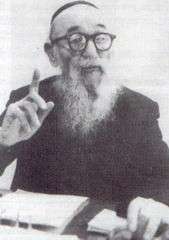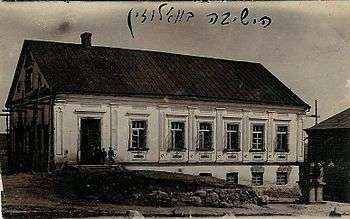Zalman Sorotzkin
Zalman Sorotzkin, also known as the Lutzker Rav (Hebrew: זלמן סורוצקין; 1881–1966), was a famous Orthodox rabbi who served as the rabbi of Lutsk, Ukraine.[1]

By the end of his life he was noted for his leadership of Moetzes Gedolei HaTorah (Council of Torah Sages, Agudath Israel)[2] The main street in Jerusalem's Kiryat Itri neighborhood, Rechov Sorotzkin,[3] is named after him.[4]
Biography
Sorotzkin was born in Žagarinė (or Zakhrina),[5][6] in 1881. Initially, he studied with his father, Rabbi Ben-Zion Sorotzkin, who was the town's rabbi. He then studied in the yeshivas of Volozhin, Slabodka, and Telz.[7]
He was a son-in-law of the Telzer rav and rosh yeshiva, Rabbi Eliezer Gordon;[8] Sorotzkin's wife's name was Miriam.[9] When Gordon died in 1910, Sorotzkin was offered the position as rabbi and rosh yeshiva in Telz. He did not accept the position and was shortly thereafter appointed Rabbi of Voranava, Belarus (near Vilna). This enabled him to establish a close relationship with Rabbi Chaim Ozer Grodzenski. In Voranava, Rabbi Sorotzkin established a yeshiva ketana.
After two years in Voranava, Rabbi Sorotzkin moved to Dziatłava (known as Zittel[5] or Zhetel: זשעטל in Yiddish), where he served as rabbi for eighteen years. As Zhetel was the birthplace of the Chofetz Chaim, the Chofetz Chaim would affectionately refer to Rabbi Sorotzkin as "my" rav.
In 1914, owing to the German invasion, Rabbi Sorotzkin moved to Minsk[9] and became a close friend of the Chazon Ish, who rented a room from Rabbi Sorotzkin. Upon the end of the war, Rabbi Sorotzkin returned to Zhetel.
In 1930, he was appointed rabbi in Lutsk, where he remained until World War II. During the early days of the war, when many yeshivas had to relocate, Sorotzkin served as the head of the Vaad Hayeshivos, at the behest of Chaim Ozer Grodzenski. Sorotzkin managed to flee the war and escape to Mandate Palestine.
When the Moetzes Gedolei HaTorah (Council of Torah Sages) of the Agudath Israel was founded in Israel, Sorotzkin was appointed vice chairman "(and after the death of Isser Zalman Meltzer served as its chairman ... until his death)."[5]
In 1953, the Chinuch Atzmai was formed and Sorotzkin was chosen to head it.[10]
Death and legacy
Sorotzkin died in Israel on June 27, 1966 (after sunset,[2][11] 9 Tammuz 5726). He is buried on Har HaMenuchot.
Sorotzkin authored the works, Oznaim LaTorah, a commentary on the Torah,[12] Moznaim LaTorah, on the Jewish festivals, Sheailos Utshuvos Moznaim LaMishpat (1955) and HaDeah ve-ha-Dibur (1937) which is a collection of derashot. "His commentary Ha-Shir ve-ha-Shevach on the Passover Haggadah (1971) was published posthumously."[5]
He was survived by five sons: Rabbis Elchonon Sorotzkin, author of Leman Achai VeRai and leader of the Chinuch Atzmai; Baruch Sorotzkin, rosh yeshiva of the Telz yeshiva in Cleveland, Ohio; Eliezer Sorotzkin, founder of Kiryat Telz-Stone in Israel; Yisrael Sorotzkin, rosh yeshiva in Lomza and Av Beit Din in Petah Tikva; and Benzion Sorotzkin, leader of Chinuch Atzmai.
References
- Rabbi Dovid Goldwasser (February 20, 2020). "Because Hashem Said So". The Jewish Press.
- "Rabbi Zalman Sorotzkin Dies; Led Council of Torah Sages". The New York Times. June 28, 1966.
- sometimes anglicized Rehov Sorotzkin
- Eisenberg, Ronald L. (2005). The Streets of Jerusalem: Who, What, Why. Devora Publishing. p. 355. ISBN 1932687548.
- "Sorotzkin, Zalman ben Ben-Zion".
- encyclopedia.com says that in 1881 it was part of Russia, but elsewhere says part of Lithuania)
- https://www.hebrewbooks.org/pdfpager.aspx?req=13314&pgnum=68
- "Sextuplets: No Other Solution". The Jewish Press. April 18, 2019.
- "Rav Zalman Sorotzkin zt"l, On His Yahrtzeit, Today, 9 Tammuz". Matzav.com. July 1, 2009.
- Saul Jay Singer (March 27, 2019). "Israel's Educational System And Chinuch Atzmai". The Jewish Press.
- The Tel Aviv reporting date was June 27, and the article said "last night" and June 27 was the 9th of Tamuz
- Rabbi Yehoshua Blass (February 7, 2014). "Present, Yet Anonymous". The Jewish Press.
External links
- HaDeah ve-ha-Dibur (HebrewBooks.org)
- Moznaim LaMishpat (HebrewBooks.org)
- Oznaim LaTora Shemos (HebrewBooks.org)
- Oznaim LaTora Vayikra (HebrewBooks.org)
